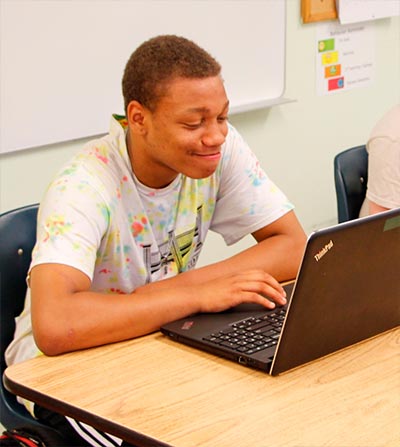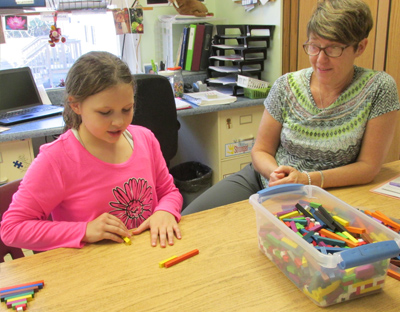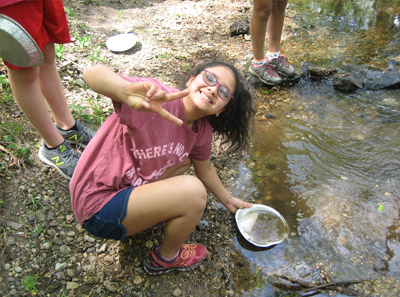The Bridge Academy’s Educational Program
The Bridge Academy’s mission is to educate and empower students with educational learning disabilities to reach their fullest potential through a comprehensive program developed around each child’s individual needs.
Students Find Success At Bridge
 Our philosophy is to help students who, despite their best efforts, are frustrated by the failure of previous instructional strategies. We know that the best way to reinvigorate these students and give them renewed self-esteem is to give them knowledgeable instructors who care deeply about them, work collaboratively with them to identify their needs, and teach them according to the way they learn.
Our philosophy is to help students who, despite their best efforts, are frustrated by the failure of previous instructional strategies. We know that the best way to reinvigorate these students and give them renewed self-esteem is to give them knowledgeable instructors who care deeply about them, work collaboratively with them to identify their needs, and teach them according to the way they learn.
Teachers Trained For Students With Learning Disabilities
Teachers work with students to implement remediation strategies to address individual weaknesses in reading, writing, math, organizational and study skills. They present creative yet challenging grade-appropriate material and employ multi-sensory teaching techniques to foster learning and mastery of skills and content. While Orton-Gillingham is the foundation of all instruction, small group instruction spans the curriculum so students receive a high degree of direct, individualized instruction and feedback.
Teachers support the curriculum with as much experiential learning as possible. Students will have a variety of activities, field trips and assemblies designed to enhance classroom learning and aligned with curriculum goals.
The Bridge Academy Special Education Program
The curriculum committee develops unique curriculum utilizing the New Jersey State Learning Standards and reflective of best practices for our special needs population.
Language Arts
The Language Arts curriculum encompasses all areas of English language instruction: basic phonics, advanced morphology, reading comprehension strategies, literature appreciation and critical thinking, vocabulary development, cursive, sentence construction, paragraph and essay writing, as well as research.
The Orton-Gillingham principles are the foundation of the language arts program. These guiding principles require curriculum to be individualized to meet the needs of each student. In addition, each component of the reading and writing curricula is delivered in a structured and sequential order, with learning progressing from simple to complex language concepts. Utilizing multi-sensory teaching strategies for the most effective delivery of curriculum, and continual cumulative review ensures students’ mastery of skills.
In addition to the Orton-Gillingham approach, supplemental programs used at The Bridge Academy include Project Read, Lindamood-Bell, Wilson Reading System, and Diana Hanbury King’s writing program. A variety of reading challenge incentives provides students with increased motivation and reinforcement of independent reading habits.
Students are grouped together based on similar needs. Groups are constructed using formal assessment, informal assessment, and teacher recommendation. The number of students in a group depends on the developmental skill level of each student. Those still mastering reading basic skills are grouped 3:1, and writing students are grouped 4:1. Experienced students who have moved beyond basic skills, such as those in a literature group, may be grouped at a 5:1 ratio to foster richer discussion.
In Writing, lessons progress from simple to complex sentence construction. Paragraph writing moves from theme-based sentences to five sentence paragraphs with topic and concluding sentences, and then on to expanded paragraphs and report writing. Advanced writing classes tackle the essay and research paper while still reviewing spelling and advanced sentence construction. Cursive handwriting is taught as part of the writing lesson, using Diana Hanbury King’s materials. Keyboarding and writing software is also taught to all students.
 Mathematics
Mathematics
The Bridge Academy has created a customized mathematics curriculum that places emphasis on developing math skills and provides students with a depth of understanding, reflects practical application and connects to other content areas.
Students are grouped according to like need in math using a framework built on the development of math process and skills. This enables more focused instruction, allowing the curriculum to be addressed at different levels of depth, and to be completed by each student on an individual timetable. Students within each multi-aged class are placed in a course based on formal assessment, informal assessment and teacher recommendation.
The framework courses of study include Symbolize, Apply, Vary, Expand, Algebra, Geometry, Algebra II, and Consumer Mathematics. Emphasis is placed on both conceptual and linguistic models of learning. Instruction is concept based using a variety of manipulatives, shared inquiry and a high frequency of problem solving dialogue. Lessons are designed to reflect several levels of understanding: intuitive, concrete, pictorial, abstract, applications, and communication.
Science
The goal of our Science curriculum is to promote scientific literacy so that our students are prepared to succeed in today’s increasingly technological world. A variety of teaching strategies are utilized to develop fundamental understandings in the life, earth, and physical sciences. In addition to content, a strong emphasis is placed on the development of critical thinking skills. Students are immersed in inquiry, through the use of laboratory experiments, interactive notebook activities, demonstrations, direct instruction, current events, technology and cooperative learning. Learning is measured through ongoing and embedded assessment.
 Social Studies and History
Social Studies and History
The Social Studies and History curriculum offers students grade level content taught in a format that allows our students to comprehend and apply the concepts and themes. Themes for class content are selected with attention to the curriculum framework. All classes are taught in small groups using a variety of methods and materials. History, geography, economics, culture and government are taught. Students are encouraged to demonstrate their knowledge through alternative assessments that include role-playing, models, visual arts, technology, and oral presentations as some examples. Technology and the use of the internet as a research tool are key components to the courses.
Co-Curricular Programs
The Art curriculum exposes students to a variety of technique and medium in studying specific artists and cultural art. Graphic arts software is taught as part of the art curriculum and is offered to the youngest through those in high school level classes. Students learn how to self-express language and ideas through art.
Physical Education/Health provides the students with a well-rounded curriculum. The physical education curriculum includes non-competitive games, team sports, individual sports, personal fitness and social games with an emphasis on sportsmanship, teamwork, cooperation and reaching personal goals. Health education content includes safety, drug education, family living, and healthy living, making personal choices, current events, environmental factors and body systems. Cross-content study and organizational strategies are woven throughout the health education program.
Performing Arts is offered to all students at The Bridge Academy through student performances and is designed to provide an introduction to the fundamentals of drama. Student performances include set design and props that are created by the students.
Technology is part of every day. Instruction is enriched through the use of technology including student laptops, digital projection systems and interactive white board. Innovative software programs designed to assist students with learning disabilities in reading, writing, comprehension, and study skills often help to motivate students. This interactivity frequently enables students to teach themselves as well as to move at their own pace. The important skills of word processing, keyboarding, basic and advanced computer skills are directly taught. All students learn to use presentation software, such as Microsoft PowerPoint, in the content areas.
Students in the upper school are enrolled in a Career Orientation class designed to explore post-secondary education, vocational training and career exploration. The scope and sequence of this curriculum includes community service, interviewing skills, career exploration, personal finance, understanding your learning disability, self-advocacy, independent living, preparation for post high school education, building a resume, and the college search and application process. Focused attention is given to each student’s interests and personal goals as delineated in the transitions section of their IEP.
Special Services Included
In addition to the school’s established curriculum, related student services are available based on the student’s Individual Education Program. These include speech-language, counseling and occupational therapy. Our specialists work closely with the student’s classroom teachers to ensure reinforcement of strategies and generalization of skills.
The philosophy of Speech and Language therapy at The Bridge Academy is to fill gaps in speech, language and learning skills where possible, and to provide benefits to the student. The majority of students who participate in speech and language therapy do so through the Integrative Services Model. This model explicitly addresses the skill development, application and maintenance phases of therapy. Integrative services include consultation with classroom teachers, speech, language and learning support within the classroom, and direct skill training outside the classroom. The type of service that is provided to an individual student may vary within a given school year, depending on changes in student development and curriculum demands. Heavy emphasis is placed on assessment and remediation of planning and organizational skills.
Self-advocacy and problem solving are ongoing focuses of our Counseling Services. Counseling supports the student’s development socially, emotionally and academically. As part of the counseling services, The Bridge Academy school counselor contacts district case managers to assist them in including students in a variety of district sponsored events, clubs and sports.
Focusing on Student Success
A key component of The Bridge Academy’s curriculum is the use of Assessments that provide information to be employed in planning and implementing each child’s program. In addition, assessment is used to identify strengths that can be used to enhance performance and self-esteem.
Formal assessments are reviewed prior to admission to The Bridge Academy. However, when a child enters our school, teachers continue to assess the student’s progress in reading, writing, and mathematics in order to establish a baseline and to evaluate the effectiveness of our services. These same assessments are administered at the end of the school year and shared as part of the IEP process, with parents, students, and case managers.
Classroom level assessments support our diagnostic teaching, which is utilized as part of our instructional practice to provide corrective action. Informal assessments in all areas include classroom observations, teacher created tests, portfolios, projects, as well as oral presentations. Students are provided with a variety of opportunities to express their mastery of the material in all subject areas. In addition, students are included in monitoring their own progress. This enhances their insight of their own learning habits, fosters development of personal learning strategies, and alleviates anxiety, or pessimism.

